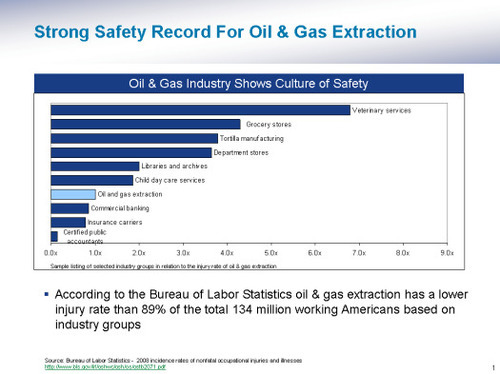…but the rate of OSHA recordable incidents in the oil and gas extraction industry is considerably less than most industries, including retailing, libraries and tortilla manufacturing.
[As an aside, yesterday’s fire on Mariner’s Vermilion Block 380 A Platform sparked renewed calls for the higher levels of government regulation of the rigs (it wasn’t a rig), with some calling for an outright end to offshore drilling (it wasn’t drilling). It seems that there is a correlation between industry knowledge and holding the industry in a positive light. The industry’s biggest detractors mainly traffic in fear, ignorance and misinformation.]

Before you discount it, be aware that the source of the data this analysis is based on is not the API or some other oil industry lobbying group, but the Bureau of Labor Statistics.
A sharp eye may note that the statistics above represent nonfatal incidents. I’ll let Mr. James Noe, CEO of Hercules Offshore (a shallow water drilling contractor) speak to the statistics for fatalities:
According to the U.S. Bureau of Labor Statistics, in 2008, there were a total of 21 fatal incidents in the oil-and-gas extraction industry [N.B. – the entire domestic industry, not just offshore – ed.]. Of course, a single death is too many, and a zero-incident rate is the goal. However, a simple review of the facts makes it clear that the industry is much safer than nearly every other industrial business.
In 2008, there were 314 fatalities in farming-crop production, 50 deaths in the fishing industry, 1,016 in the construction business, 498 truckers, 58 taxi drivers, 39 tow-truck drivers, 54 trash collectors and 78 auto mechanics lost their lives. Even in non-industrial settings, many jobs are significantly more dangerous than working on a rig. Forty-eight people died in 2008 working at grocery stores, 44 performing artists, 29 janitors and 302 working in retail stores.
The safety of our industry isn’t by accident or luck. The safety of our employees and the environment is our most sacred obligation. At Hercules Offshore alone, we have trained 5,609 employees. We have long empowered every employee with the authority to call a time out and stop the job — any job. In fact, we make it everyone’s personal responsibility to stop unsafe jobs. Every employee carries a “Time-Out License” that states: “The bearer of this license accepts responsibility for and is fully authorized to call a ‘Time-Out for Safety’ on any Hercules Offshore site or job where he/she perceives a situation to be unsafe or otherwise has concerns about safety.”
It would be foolish to say that the offshore industry is perfectly safe. Those 13 guys who spent a couple of hours in the Gulf yesterday can testify to that. But the fire was contained, the wells shut down as they were supposed to, and, thank God, everyone is now safe.
But it is even more foolish to expect that it can be made perfectly safe. This is a heavy industry with a good and improving track record, better than most any other comparable industry you can name.
Cross-posted at VladEnBlog.












Join the conversation as a VIP Member